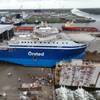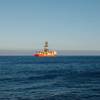As recent events have shown, no single judicial action is likely to have as much impact on the maritime community in the next decade as the Supreme Court?s U.S. v. Locke (Intertanko) decision. Last year, the Supreme Court ruled unanimously that a state could not impose tanker safety standards that exceeded the federal standards set by the Oil Pollution Act of 1990 (OPA 90). At the time, it was widely hailed as a major victory for tanker owners. The decision appeared to limit states? ability to regulate shipping; but on second glance, something far more dangerous to the maritime community was contained within. The Supreme Court outlined a road map for how any state could pass legislation and implement regulations with far reaching implications.
The gist of the legal loophole is this. U.S. v. Locke clearly states that the federal government authority is responsible for regulations pertaining to crew, construction, and vessel operation. However, the decision showed a state how to enact legislation by making it relevant to local waterways. Read it this way. Federal trumps State, but Local can trump Federal. Additionally, U.S. v. Locke confirmed that the states have authority over compensation and liability, which allows them to set any dollar amount on any sort of claim.
With road map in hand, many states have actively pursued legislative agendas that can create additional financial and administrative burdens for vessel owners and operators. Other states may follow. Alaska recently passed legislation, explicitly allowed under the Intertanko decision. Alaska requires varying amounts of financial responsibility, depending on whether a vessel is carrying persistent or non-persistent oil, based on the vessel?s storage capacity. The liability limits can be substantially higher than under OPA 90. California state requirements are substantially higher than the federal for response plans, oil pollution spill drills, and non-tank vessels. Washington State also has pending legislation that would institute financial responsibility requirements similar to California?s. States also retain broad authority to determine ?how clean is clean? under OPA.
For the record, protecting America?s waterways from pollution is a shared goal of the marine community. No one loves the water more. Note that under OPA 90, the United States has the strictest pollution liability laws of any nation on the planet. This has dramatically reduced oil spills.
Long-term, proliferation of many local laws is a bad thing for the maritime community and industries that serve it. The marine industry already operates on very limited profitability. Perhaps unknowingly, the states are creating an increasingly difficult environment for shipping interests to operate in. These impediments to trade have implications for the marine community. One can even foresee situations where you would have to violate one state?s laws to meet the requirements of another.
In this already heavily regulated environment, members of the maritime community should encourage their Congressman to support the existing federal and international standards in place. Further involvement and perhaps over-regulation from the states takes protecting the waterways out of the domain of current federal authorities, including the Coast Guard, who have performed admirably.
Rich Hobbie, is the President of WQIS, the leading insurer of marine vessels in the United States. WQIS recently broadened its coverage to protect vessel owners and operators from increased state legislation, civil fines and penalties. For questions about state laws, visit the state law directory at www.wqis.com.
Sponsored Content
Chris-Marine’s solutions help to prolong engine lifetime

Subscribe for
Maritime Reporter E-News
Maritime Reporter E-News is the maritime industry's largest circulation and most authoritative ENews Service, delivered to your Email five times per week










